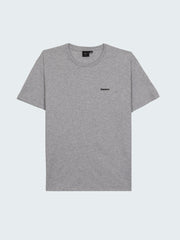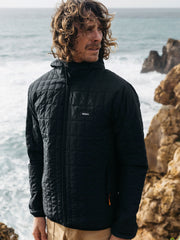When we first ventured into denim, our thought process was simple: how could we innovate an everyday product, maintain aesthetic yet elevate function, all the while keeping it local by working with UK manufacturers?
UK Denim | In Conversation With Patrick Grant
09.15.16
4 min read
Our first jean was born out of this desire, and we haven’t stopped striving for home grown excellence since. The Camber Jean was an exciting new innovation that blended the softness of Merino with the durability of a 10.5oz denim in a bespoke Finisterre cut. It became a talking point in the denim world and a great platform from which to jump.
The range has now expanded, from a water-repellent finish on the Anatis Jean to continuing our wool denim development in the Ovis, all made at Cookson & Clegg’s historic Blackburn factory. Combining our considered approach to design with Cookson & Clegg’s long standing tradition of quality, it’s a relationship we’re proud of.
Made in Britain and built to last: it doesn’t get more simple than that.
Patrick Grant is the man at the helm of Cookson & Clegg, taking over the historic workwear factory in 2012. Grant is responsible for giving Britain back its textile integrity, always committed to highlighting the quality and heritage of British manufacturing. We were excited to work with such an innovator on our denim range.
Can you tell us a bit about the early beginnings of Cookson & Clegg, and what drew you to jump on board with them?
Cookson & Clegg started a long time ago in 1860 as a manufacturer of leather goods. They began making book uppers and then went into making protective apparel. From there they made the move into making leather garments for the British military in the period running up to the Second World War. By then they had become a fully fledged supplier of clothing and protective gear – both technical and traditional outerwear – to the British Army, a service they continued right through to 2009. They developed all sorts of iconic pieces, like the field jacket and the cold weather parka and other bits of famous British military apparel. They were also the first manufacturer of the duffle coat.
We started working with them about 4 years ago. We were looking for a main factory for outerwear and chinos and jeans – we had tried pretty much every factory in the UK, and it wasn’t until were told that someone from one of our suppliers had moved to Cookson & Clegg that we even heard of the factory. Until 2009 they’d only really been making for the MOD and we just liked the stuff! It was brilliant quality clothing.
You’ve been described as someone who’s helping to save the British textiles industry, namely through your initiative Community Clothing which helps revive British factories that have closed down. Is that something you set out to do?
I was aware that a lot of great factories around the UK had closed and that the products that they used to make had been shipped overseas, and I was thinking about the fact that lots of people in the UK would like to buy British made clothes but British made clothes on the whole are quite expensive.
From a business perspective it is absolutely essential for the existence of our business – in the form it’s in today – that we keep all the UK manufacturers going because we need them to sustain our business. So we do it because we are part of the same ecosystem, and we want that ecosystem to thrive.
But on a personal level, I would like to live in a country where there are opportunities for great job towns like Blackburn, Bolton, Rochdale and all the other places we buy from. I feel I have an opportunity to support these industries. I mean, the amount of real support we’re able to give them is relatively small, but we can very vocal about the need for supporting them, and so we can try to encourage other people we work with – who might be a lot bigger – to do the same, and then it will have a real effect.
How did working with Finisterre come about?
Finisterre approached the factory about doing their manufacturing. Cookson & Clegg are very good at manufacturing jeans – in fact I don’t think there is a better factory. There isn’t. It was as simple as that really. But I think it’s a really great brand. Personally, I have a great affinity for brands that really know who they are, who they serve, and who they stand for. Finisterre is one of those.
To you, what sets British manufacturing apart from manufacturing overseas?
There’s a lot of good manufacturing in many other countries. But what makes British manufacturing so distinctive is our rich history of making, and the fact that we are specialists in our fields. We work with people who have specialised in one type of manufacturing for many years, and the machinery is only as good as the people who operate it. So when you have knitters, shirt makers and more who have been doing their job for 20 plus years, they get to be exceptionally good at it. The stability, the knowledge, the craft: that is what sets UK manufacturing apart.
















































































